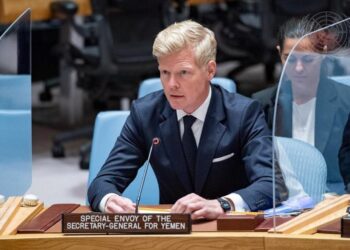Iraq has been facing a series of diplomatic crises with Sweden and Denmark over the burning and desecration of the Quran and the Iraqi flag by Iraqi asylum-seekers in the Scandinavian countries. The Iraqi government has accused foreign parties of orchestrating a plot to provoke the Iraqis and destabilize the country ahead of the provincial elections in December.
The tensions escalated last week when supporters of influential Shia cleric Muqtada al-Sadr stormed and torched the Swedish embassy in Baghdad, following a planned Quran burning in Stockholm by an Iraqi Christian living in Sweden. The same night, Sadr’s followers also attempted to breach the Green Zone, the fortified area that hosts most governmental offices and embassies, and target the Danish embassy after a far-right group burnt the Quran and Iraq’s flag outside the Iraqi mission in Copenhagen.
Iraqi President Abdel Latif Rashid denounced the incidents as a “sedition plot” carried out by people living abroad and exploiting free speech laws “to implement suspicious aims against Iraq and Iraqis”. He said that “the sequence of events indicates that there is an intentional aim to provoke the Iraqis exclusively to show our country as an unsafe country for foreign missions”. He also accused those responsible of seeking “to tarnish the image of a stable and secure Iraq, damage its international reputation and deprive it of cooperation with other countries”.
In response to the Quran burning in Stockholm, Iraqi Prime Minister Mohammed Shia al-Sudani announced that he had ordered the expulsion of the Swedish ambassador from Iraq and the withdrawal of the Iraqi charge d’affaires from Sweden. He also said that Iraq would cut off diplomatic relations with Sweden if the Quran burning went ahead. However, despite his warning, two men held an anti-Islam protest near the Iraqi embassy in Stockholm on Saturday, where one of them, identified by Swedish media as Salwan Momika, stepped on and kicked the Quran, but did not set it on fire. Momika also stepped on and kicked an Iraqi flag, as well as photographs of al-Sadr and of Iran’s supreme leader, Ayatollah Ali Khamenei.
Following the protest and al-Sudani’s announcement, the head of Iraq’s Media and Communications Commission announced it had suspended the license of Swedish communications company Ericsson to operate in Iraq. The commission also warned other foreign companies to respect Iraq’s sovereignty and security or face legal action.
The diplomatic crisis between Iraq and Sweden has also drawn reactions from other countries and international organizations. The European Union condemned the attack on the Swedish embassy and called for respect for freedom of expression and religious tolerance. The United Nations expressed concern over the rising tensions and urged all parties to exercise restraint and dialogue. Iran, a close ally of Iraq, denounced the Quran burning as an insult to Islam and Muslims, and praised al-Sadr for his stance against it. Turkey, another regional power, also condemned the Quran burning and expressed solidarity with Iraq.
Some analysts have suggested that al-Sadr’s role in the crisis is part of his strategy to assert his influence and popularity in Iraq ahead of the elections. Al-Sadr, who leads a powerful political bloc in parliament, had declared last year that he had left politics and would focus on social and religious activities. However, he has since re-emerged as a key player in several issues, such as anti-government protests, security reforms, and regional affairs.
Others have speculated that there may be external forces behind the provocative acts in Scandinavia, such as Israel or Saudi Arabia, who are opposed to Iraq’s growing ties with Iran and its role in mediating between regional rivals. They argue that these forces aim to create chaos and violence in Iraq and undermine its stability and sovereignty.
The Iraqi government has vowed to protect its diplomatic missions abroad and to hold accountable those who attack foreign missions in Iraq. It has also called for calm and unity among its people and urged them not to fall for sectarian or ethnic provocations.







